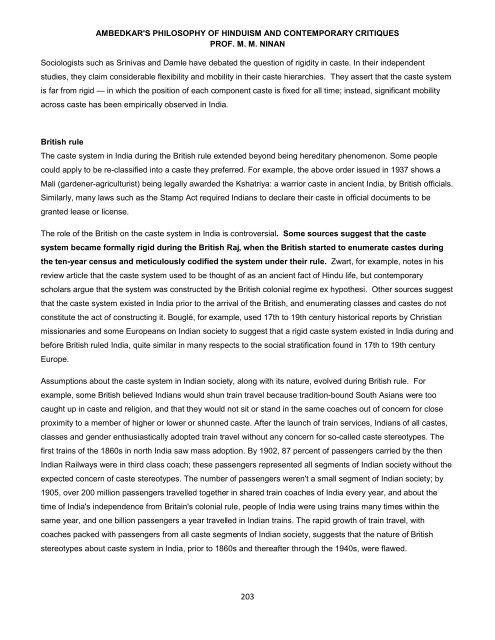Ambedkar-Philosophy of Hinduism
Create successful ePaper yourself
Turn your PDF publications into a flip-book with our unique Google optimized e-Paper software.
AMBEDKAR'S PHILOSOPHY OF HINDUISM AND CONTEMPORARY CRITIQUES<br />
PROF. M. M. NINAN<br />
Sociologists such as Srinivas and Damle have debated the question <strong>of</strong> rigidity in caste. In their independent<br />
studies, they claim considerable flexibility and mobility in their caste hierarchies. They assert that the caste system<br />
is far from rigid — in which the position <strong>of</strong> each component caste is fixed for all time; instead, significant mobility<br />
across caste has been empirically observed in India.<br />
British rule<br />
The caste system in India during the British rule extended beyond being hereditary phenomenon. Some people<br />
could apply to be re-classified into a caste they preferred. For example, the above order issued in 1937 shows a<br />
Mali (gardener-agriculturist) being legally awarded the Kshatriya: a warrior caste in ancient India, by British <strong>of</strong>ficials.<br />
Similarly, many laws such as the Stamp Act required Indians to declare their caste in <strong>of</strong>ficial documents to be<br />
granted lease or license.<br />
The role <strong>of</strong> the British on the caste system in India is controversial. Some sources suggest that the caste<br />
system became formally rigid during the British Raj, when the British started to enumerate castes during<br />
the ten-year census and meticulously codified the system under their rule. Zwart, for example, notes in his<br />
review article that the caste system used to be thought <strong>of</strong> as an ancient fact <strong>of</strong> Hindu life, but contemporary<br />
scholars argue that the system was constructed by the British colonial regime ex hypothesi. Other sources suggest<br />
that the caste system existed in India prior to the arrival <strong>of</strong> the British, and enumerating classes and castes do not<br />
constitute the act <strong>of</strong> constructing it. Bouglé, for example, used 17th to 19th century historical reports by Christian<br />
missionaries and some Europeans on Indian society to suggest that a rigid caste system existed in India during and<br />
before British ruled India, quite similar in many respects to the social stratification found in 17th to 19th century<br />
Europe.<br />
Assumptions about the caste system in Indian society, along with its nature, evolved during British rule. For<br />
example, some British believed Indians would shun train travel because tradition-bound South Asians were too<br />
caught up in caste and religion, and that they would not sit or stand in the same coaches out <strong>of</strong> concern for close<br />
proximity to a member <strong>of</strong> higher or lower or shunned caste. After the launch <strong>of</strong> train services, Indians <strong>of</strong> all castes,<br />
classes and gender enthusiastically adopted train travel without any concern for so-called caste stereotypes. The<br />
first trains <strong>of</strong> the 1860s in north India saw mass adoption. By 1902, 87 percent <strong>of</strong> passengers carried by the then<br />
Indian Railways were in third class coach; these passengers represented all segments <strong>of</strong> Indian society without the<br />
expected concern <strong>of</strong> caste stereotypes. The number <strong>of</strong> passengers weren't a small segment <strong>of</strong> Indian society; by<br />
1905, over 200 million passengers travelled together in shared train coaches <strong>of</strong> India every year, and about the<br />
time <strong>of</strong> India's independence from Britain's colonial rule, people <strong>of</strong> India were using trains many times within the<br />
same year, and one billion passengers a year travelled in Indian trains. The rapid growth <strong>of</strong> train travel, with<br />
coaches packed with passengers from all caste segments <strong>of</strong> Indian society, suggests that the nature <strong>of</strong> British<br />
stereotypes about caste system in India, prior to 1860s and thereafter through the 1940s, were flawed.<br />
203


















